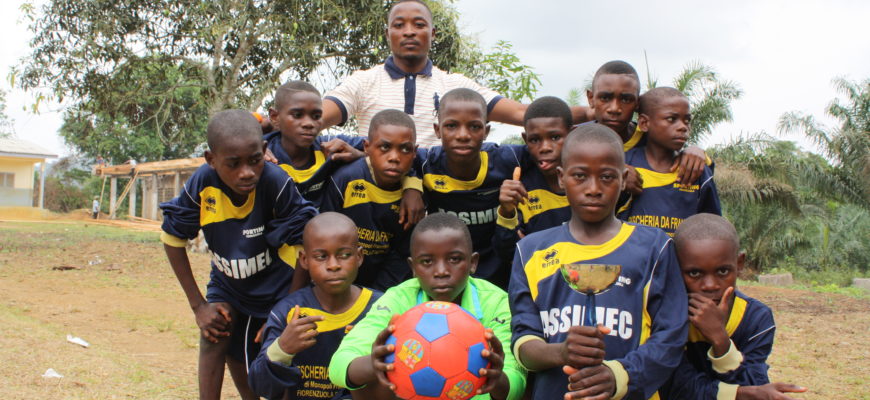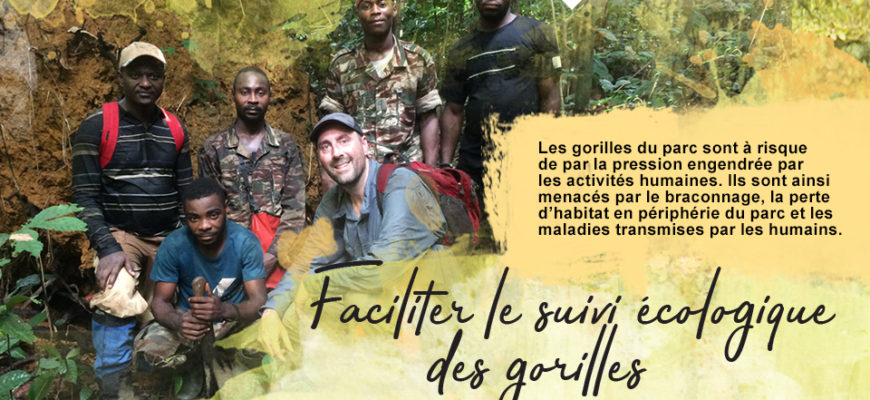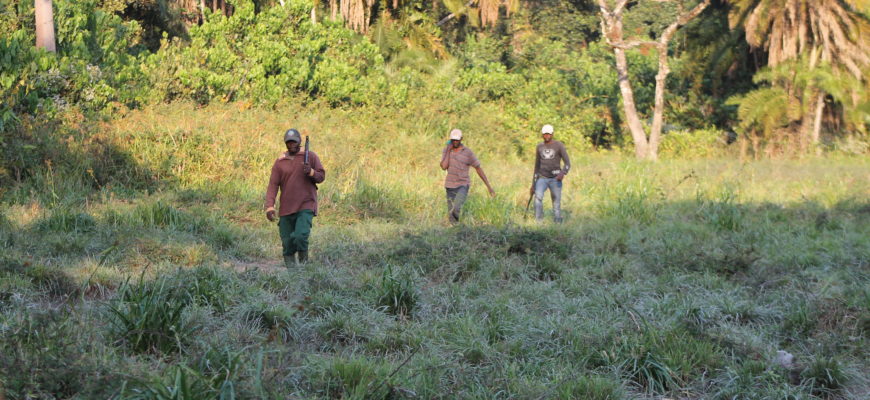Improve Access to Education for Indigenous Peoples

The Vulnerable Indigenous Peoples Plan, through its education component, aims to improve access to education for Bakola / Bagyeli children so that they are incorporated better into the society. To achieve this goal, different actions are carried out daily:
- Raising awareness of parents and children
- Supporting the NgoyangHome’s operations in aspects related to housing, nutrition, education, and health
- Monitoring children inside and outside of school
- Providing support to students in aspects related to school supplies, accommodation, and nutrition
- Giving young Bakola / Bagyeli students access to a professional formation
- Completing school enrollments censuses
Several strategies have been used to carry out these actions:
- Signing collaboration protocols with public institutions
- Organizing visits to schools and communities
- Providing financial, material and food support to the Ngoyang School Home
Among the results achieved, we can mention:
- The number of Bakola / Bagyeli students increased from less than 100 in 2005 to 286 in 2013
- 51 certified students
- 2 trained seamstresses
- 2 trained carpenters
- 1 trained office secretary
- 3 trained auto mechanics
- 5 trained hairdressers
The efforts undertaken by theFondation pour l’Environnement et le Développement au Cameroun (FEDEC) havelong-term impacts on Bakola / Bagyeli populations. These can be observed at several levels:
- The Bakola / Bagyeli parents’ enthusiasm for sending their children to school
- Year-over-year increase in the number of students enrolled in high school
- Reduction of absenteeism among Bakola / Bagyeli children
- Better integration of Bakola / Bagyeli children into the society
- The Bantu populationsgive a greater consideration to the Bakola / Bagyeli populations
- An increasing number of Bakola / Bagyeliregisteredgraduates
- A clear improvement in the claim forrights and respect of indigenous populations’ duties.
- The emergence of leaders in the Bakola / Bagyeli populations
Biodiversity Conservation Project at Campo Ma’an National Park

The Campo Ma’an National Park, with an area of 264,064 hectares, was created in 2001 as an environmental compensation for the Chad-Cameroon Pipeline Project.
Located in the province of Sud Cameroun, the Campo Ma’an National Park is a reservoir of biodiversity with more than 80 species of large and medium mammals including gorillas and elephants. Such a biodiversity has attracted the attention of the Zoo de Granby (Canada), which through its nearly 66-year history (founded in 1953), has almost always kept and presented elephants and gorillas in its facilities.
Following a growing desire to act beyond its Canadian geographical limits, the Zoo de Granby launched in 2015 a conservation project in Cameroon in partnership with FEDEC at the Campo Ma’an National Park.
The Zoo de Granby wishes to have a real impact on the survival of animal species in the wild. Five objectives have been identified to carry out this conservation initiative for the elephants, gorillas and other threatened species:
- Equip ecoguards in the fight against poaching.
- Facilitate ecological monitoring of gorillas.
- Understand and solve conflicts between elephants and humans.
- Contribute to the education mission in the Park with the local populations.
- Support local development initiatives.
It is not only these challenges, but also its great dedication to the protection of animals that motivated FEDECto work in collaboration with the Zoo de Granby at the Campo Ma’an National Park. To support the Zoo de Granby in its ambitious overseas project, join their fundraising campaign.
Target: CAD$200,000 (FCFA87,000,000)
This conservation project is carried out in partnership with the Ministry of Forestry and Wildlife, Concordia University (Canada), African Wildlife Foundation and World Wildlife Fund.
Facilitate Health Care Access for the Indigenous People

One objective of the FEDEC through the Vulnerable Indigenous People Plan is to facilitate health care access for the Bakola/Bagyeli in order to reduce the high mortality and morbidity rate in their communities. As such, the following activities are conducted in the field:
- Program of awareness and sensitization on diseases such as malaria and AIDS
- Treatment of Bakola/Bagyeli ill patients
- Community health agents training
- Traditional birth attendantstraining and support
- Registration of births and establishment of birth certificates
FEDEC’s intervention strategies consist of:
Signing collaboration protocols with state and religious health centers to ensure care and follow-up of Bakola / Bagyeli patients
- Support for advanced strategy and expanded immunization programs
- Supplying pharmaceutical products to health centers
Results of these interventions:
- 4,834 patients have been treated since 2008
- 1,890 people were vaccinated, including 1,179 pregnant women and 711 children aged 0-5
- 66 tuberculosis-affected patients were treated
- 17 hernias were detected and treated
- 40 AIDS cases have been detected and are followedup
FEDEC interventions’ impacts are considerable in the health component; we can observe:
- A sharp decrease in infant mortality from 30% in 2004 to less than 15% in 2013
- A population increase in the Bakola / Bagyeli communities
Support for the Management of the Mbam Djerem National Park

The Mbam Djerem National Park which covers an area of 416 512 ha was created on 06 January 2000 as environmental compensation for the Pipeline project Chad Cameroon. It benefits from this fact, from the financial support of the Foundation for Environment and Development in Cameroon (FEDEC) since 2003 for the implementation of its activities.
Stretched between the regions of Adamaoua, East and Central Cameroon, the Mbam and Djerem National Park is located in the forest-savannah transition zone, which gives it an exceptional biological diversity, Habitats, and animal species including mammals including threatened species such as elephant, chimpanzee, colobe guereza, reptiles, fish, amphibians, birds and a wide variety of plant formations.
The PNMD faces multiple pressures and threats including landlocked and ambient poverty, poaching and trade in endangered species, livestock grazing, negative impacts of industrial projects in the periphery that are likely to jeopardize survival Of this precious natural heritage. As part of the Mbam and Djerem National Park Development Project since 2003 implemented by the Wildlife Conservation Society (WCS), FEDEC in support of government conservation policy, FEDEC provides support Financial and continuous monitoring in the field of project implementation. After a decade of intervention thanks to the combined efforts of MINFOF, FEDEC and WCS, significant results have been recorded in the following areas:
– Protection of the Park and Education for Conservation
– Research and ecological / socio-economic monitoring
– Valorisation of resources and co-management
– Building the capacity of the Conservation Service




Recent CommentsRecents Comments